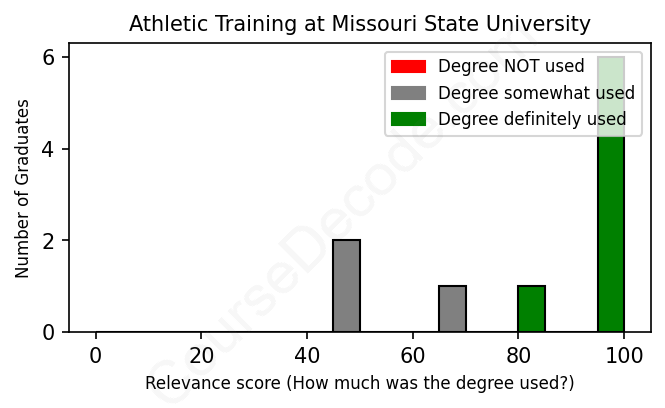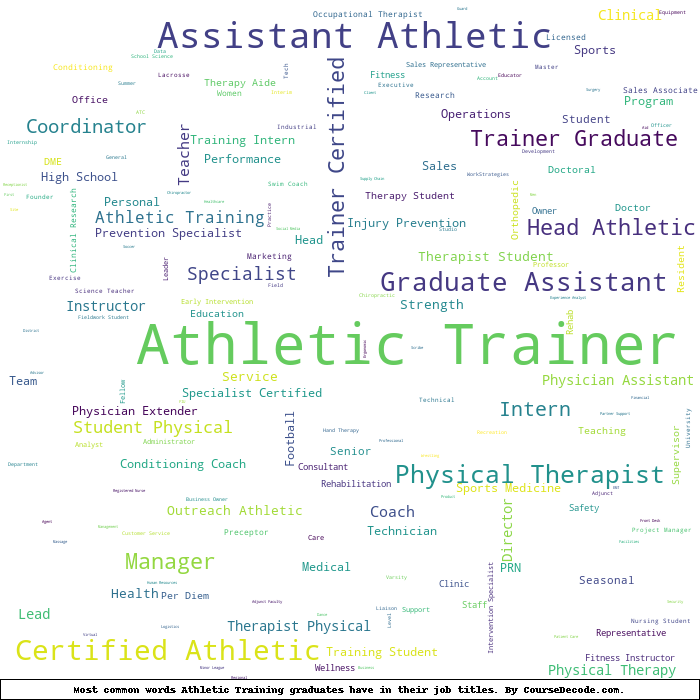
First, some facts. Of the Athletic Training graduates from Missouri State University we've analyzed , here's how many have used (or NOT used) their degree in their career:

These are estimates based on AI analysis of 10 LinkedIn profiles (see below).
The verdict? Significantly above average. Overall, with an average relevance score of 84%, Athletic Training graduates from Missouri State University have a much higher likelihood (+17%) of finding work in this field compared to the average graduate across all fields:
And for comparison, here's the chart for all profiles we've looked at across all degrees.
Also, after graduating, 80% of these graduates have pursued further education other than another Bachelor's degree (such as a Masters degree or other), compared to the average across all profiles of 35%. This suggests you may need more than just a Bachelors degree to be competitive as a Athletic Training graduate.
See the details:
|
Relevance score: 47% We think this person has gone into a career only somewhat relevant to their degree. We think this person has gone into a career only somewhat relevant to their degree.
DEGREE INFOGraduated in 2012 from Missouri State University with a Bachelor of Science (B.S.) in Athletic Training. Also pursued further education since (see below). JOB HISTORY SINCE GRADUATIONGraduate Assistant Athletic Trainer Texas A&M University-Corpus Christi Aug 2012 - May 2014 Certified Athletic Trainer  Mercy Aug 2014 - Aug 2016 Athletic Trainer II  Mercy Aug 2016 - Jul 2018 Social Media Director | Affiliate Manager  Yard Mastery, Inc Feb 2019 - Apr 2021 Content Creator  The Lawn Guardian May 2018 - Present FURTHER DEGREES DONE SINCE GRADUATINGMaster of Science (M.S.)Texas A&M University-Corpus Christi 2012 - 2014 ABOUTAs a dedicated stay-at-home dad, I prioritize the well-being of my family while also pursuing skills in search engine optimization, keyword research and analysis, social media marketing, videography, and video editing. These self-taught skills have developed from my hobby of lawn care and running my own YouTube channel. Additionally, my experience as a full-time stay-at-home parent has honed my time management, multitasking, problem-solving, adaptability, and communication skills. I am eager to leverage this unique combination of family dedication, digital marketing, and parenting skills to contribute to the success of businesses in the digital landscape. |
The top 10 most common jobs done by the graduates we've analyzed (ranked most common to least) are:
Looking at the career paths of graduates with a degree in Athletic Training from Missouri State University, it's clear that many of them have landed jobs that are closely related to their field. A significant number of these graduates have taken on roles as Athletic Trainers, Clinical Instructors, and even professors, which directly utilize their skills and knowledge in athletic training. Positions like Graduate Assistant Athletic Trainer, Certified Athletic Trainer, and Athletic Trainer roles encompass responsibilities such as injury prevention, assessment, and rehabilitation—core components of what they learned during their studies. These jobs are a perfect fit for someone with an Athletic Training background and show a clear connection to their education.
However, there are also several examples of graduates branching out into roles that aren't as closely aligned with athletic training. Some have ventured into positions like Physical Therapist Assistant, Social Media Director, or even business ownership, where the core application of athletic training skills isn't necessary. While some roles may still rely on relevant knowledge like anatomy and patient care, they don't focus on the hands-on athletic training skills that many graduates trained for. Overall, while a majority of the jobs tend to be relevant to athletic training, there is a noticeable shift for some graduates toward fields or roles that don’t directly relate to their Athletic Training degree. This highlights that while the degree provides a solid foundation, graduates have the potential to explore a variety of career paths beyond traditional athletic training roles.
Here is a visual representation of the most common words in job titles for Athletic Training graduates (this is across all Athletic Training graduates we've analyzed, not just those who went to Missouri State University):

Looking at the career trajectories of graduates from Missouri State University with a degree in Athletic Training, it seems like many of them initially dive into related roles right after graduation. A lot of these folks start off as graduate assistant athletic trainers or certified athletic trainers, often taking positions in universities, hospitals, or rehabilitation centers. It's pretty common to see them moving from these entry-level roles to more advanced positions like clinical education coordinators or assistant professors within just a few years. For example, one graduate from the Class of 2010 progressed from a graduate assistant role into several higher-level athletic training and educational positions over the next decade.
However, there are also some graduates who expand their horizons into related fields, like physical therapy or even business. For instance, one graduate transitioned from being a certified athletic trainer to working as a physical therapist assistant. This shows that while many stick closely to athletic training, others branch out to explore different avenues in healthcare. Five to ten years down the line, the picture is a bit mixed—some are making great strides in athletic training or physical therapy, while others have shifted their careers away from direct athletic training roles entirely. Overall, it appears that graduates from Missouri State University have a solid start in their careers, typically staying in the health and wellness field, but there's also a notable variety in career paths that can lead them to different opportunities over time.
Getting a Bachelor’s degree in Athletic Training at Missouri State University, or really anywhere, can be pretty challenging but totally doable if you're committed. The program involves a good mix of hands-on experience and classroom learning, covering everything from anatomy and injury prevention to rehabilitation techniques. You’ll be working with athletes and embracing some clinical hours, which is great for getting real-world experience but can also feel like a lot at times. Overall, I'd say it's a bit on the tougher side compared to some other degrees because it requires a solid grasp of scientific concepts and a lot of practical application, but if you’re passionate about sports and helping others, it can also be incredibly rewarding!
Most commonly, in the LinkedIn profiles we've looked at, it takes people 4 years to finish a Bachelor degree in Athletic Training.
Alright, so looking at this list of Athletic Training grads from Missouri State University, it seems like they've had a pretty varied journey in their careers. A lot of them started as graduate assistants or interns, which doesn’t typically pay super well, but they’ve gradually moved up into roles like Clinical Education Coordinators and Assistant Professors, which are usually higher-paying positions. Some have also ventured into cool stuff like business ownership and social media management, which can be lucrative. The ones who became Physician Assistants also likely make decent money, as that field generally pays well. Overall, it seems like many of these folks have been able to find good opportunities, especially if they stuck with it and moved into more advanced roles, so it looks like they're doing okay financially!
Here is a visual representation of the most common words seen in the "about" section of LinkedIn profiles who have a Bachelor degree in Athletic Training (this is across all Athletic Training graduates we've analyzed, not just those who went to Missouri State University). This may or may not be useful:

Here are all colleges offering a Bachelor degree in Athletic Training (ordered by the average relevance score of their Athletic Training graduates, best to worst) where we have analyzed at least 10 of their graduates:
| College | Score | Count |
|---|---|---|
 Missouri State University Missouri State University
|
84 | 10 |
 Slippery Rock University of Pennsylvania Slippery Rock University of Pennsylvania
|
79 | 10 |